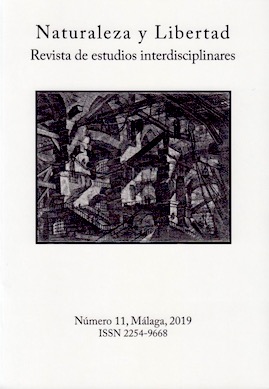El yo fracturado. Sensación de agencia y psicopatología
DOI:
https://doi.org/10.24310/NATyLIB.2019.v1i11.5578Keywords:
psicopatología filosófica, sentido de agencia, libertad y determinismo, filosofía de la psiquiatría,Abstract
Tras los experimentos de B. Libet, la discusión contemporánea sobre la libertad y el determinismo ha inclinado la balanza hacia este úl-timo. El avance de las neurocienciasha reenfocado la discusión antes centrada en la idea de libertad hacia el concepto de “sensación de agen-cia” (SA) y con ello el trabajo de la psicopatología de la acción ha sido un terreno fructífero para dicha querella. En la presente investigación sos-tengo que algunos casos de disrupciones en la agencia, como algunas patologías psicológicas y motoras, pueden servir como evidencia para SA. Al final de la investigación revisaré algunas consecuencias normativas del SA.
Downloads
Metrics
References
Aboitiz, Francisco et alia, (2003), “The Alien Hand Syndrome: Classification of Forms Reported and Discussion of New Condition” en Neurol Sci, 24, pp. 252-257.
Aouizerate, Bruno et alia, (2006), “A Systematic Review of Psychosurgical Treat-ments for Obsessive-Compulsive Disorder: Does Deep Brain Stimulation Represent the Future Trend in Psychosurgery?” en Clinical Neuropsychiatry, 3(6), pp. 391-403.
Balconi, Michaela, (ed.), (2010), Neuropsychology of the Sense of Agency. From Consciousness to Action, Springer.
Bickle, John, Mandik, Peter & Landreth, Anthony, (2012), "The Philosophy of Neu-roscience", The Stanford Encyclopedia of Philosophy, Edward N. Zalta (ed.), URL = <http://plato.stanford.edu/archives/sum2012/entries/neuroscience/>.
Bratman, Michael, (1987), Intentions, Plans, and Practical Reason, Cambridge University Press.
Block, Ned, (2007), Consciousness, Function, and Representation. Collected Pa-pers, Vol. I, MIT Press.
Churchland, Patricia, (2011), Brain Trust. What Neuroscience Tell Us about Mo-rality, Princeton.
Daprati, Elena et alia, (1997), “Looking for the Agent: An Investigation into Con-sciousness of Action and Self Consciousness in Schizophrenic Patients” en Cognition, 65, pp. 71-86.
Davidson, Donald, (2001), Essays on Actions and Events, Oxford.
Dennett, Daniel, (1984), Elbow Room. The Varieties of Free Will Worth Wanting, Oxford.
Della Sala, Sergio et alia, (1991), “Right-sided Anarchic (Alien) Hand: A Longitu-dinal Study” en Neuropsychologia, 29 (11), pp. 1113-1127
Franck, Nicolas, et alia, (2001), “Defective Recognition of One’s Own Actions in Schizophrenic Patients” en American Journal of Psychiatry, 158, pp. 454-459
Frankfurt, Harry, (1988), The Importance of What We Care About, Cambridge.
Freud, Sigmund, (1917), Zur Psychopathologie des Alltagslebens, S. Karger
Frith, Chris, et alia, (2000), “Explaining the Symptoms of Schizophrenia: Abnor-malities in the Awareness of Action” en Brain Research Review, 3, pp. 357-363
Glock, Hans-Johann, (2008), What is Analytic Philosophy?,Cambridge
Graham, George, (2010), The Disordered Mind. An Introduction to Philosophy of Mind and Mental Illness, Routledge, Taylor & Francis.
Graham, George & Stephens Lynn (eds.), (1994), Philosophical Psychopathology, MIT
James, William, (1890), The Principles of Psychology, London: Macmillan.
Kane, Robert, (2002), The Oxford Handbook of Free Will, New York, Oxford Uni-versity Press
Kim, Jaegwon, (2000), Mind in a Physical World. An Essay on the Mind-Body Prob-lem and Mental Causation, MIT Press
Levy, Neil, (2007), Neuroethics. Challenges for the 21ts Century, Cambridge
Libet, Benjamin, (1985), "Unconscious Cerebral Initiative and the Role of Con-scious Will in Voluntary Action" en The Behavioral and Brain Sciences, 8: 529-566
Lhermitte, François, et alia, (1983), “Human Autonomy and the Frontal Lobes. Part I: Imitation and Utilization Behavior: A Neuropsychological Study of 75 Patients” en Ann Neurol, 19, pp. 326-334
Pereboom, Derk, (2001), Living without Free Will, Cambridge University Press
— , (2014), Free Will, Agency, and the Meaning of Life, Oxford University Press
Racine, Eric, (2010), Pragmatic Neuroethics. Improving Treatment and Under-standing of the Mind-Brain, MIT Press
Rachman, Stanley, (1997), “A Cognitive Theory of Obsessions” en Behav. Res. Ther, 35(9), pp. 793-802
Rocco, Genaro (ed.), (2015), Disturbed Consciousness. New Essays on Psycho-pathology and Theories of Consciousness, The MIT Press
Roessler Johannes & Elian Naomi (eds), (2003), Agency and Self-awareness: Is-sues in Philosophy and Psychology, Oxford University Press, Oxford.
Sinnott-Armstrong, Walter & Nadel, Lynn, (eds.), (2011), Conscious Will and Re-sponsibility. Oxford.
Smilansky, Saul, (2000), Free Will and Illusion, Oxford.
Steward, Helen & Hyman, John, (eds.), (2004), Agency and Action, Cambridge University Press.
Strawson, Galen, (2010), Freedom and Belief, Oxford.
Strawson, Peter, (2008), “Freedom and Resentment” en Freedom and Resentment and other Essays, Routledge, pp. 1-28.
Velleman, David, (2000), The Possibility of Practical Reason. Oxford.
Velmans, Max & Schneider, Susan (2007), The Blackwell Companion to Conscious-ness, Blackwell Publishing.
Wegner, Daniel, (2002), The Illusion of Conscious Will, Cambridge, MIT Press.
Young, Garry, (2013), Philosophical Psychopathology. Philosophy without Thought Experiments, Palgrave Macmillan.
Downloads
Published
How to Cite
Issue
Section
License
Those authors who have publications with this journal, accept the following terms:
1. Copyright and licensing information are clearly described on the journal’s web site: all content published in Naturaleza y Libertad is open acces without limit, and are subject to the Attribution-NonCommercial-ShareAlike 4.0 International (CC BY-NC-SA 4.0) license. The full text of which can be consulted at https://creativecommons.org/licenses/by-nc-sa/4.0/
2. It is the responsibility of the authors to obtain the necessary permissions for the images that are subject to copyright. The authors whose contributions are accepted for publication in this journal will retain the non-exclusive right to use their contributions for academic, research and educational purposes, including self-archiving or deposit in open access repositories of any kind. The electronic edition of this magazine is edited by the Editorial de la University of Malaga (UmaEditorial), being necessary to cite the origin in any partial or total reproduction.
3. This journal allows and encourages authors to publish papers on their personal websites or in institutional repositories, both before and after their publication in this journal, as long as they provide bibliographic information that accredits, if applicable, your posting on it.
4. In no case will anonymous papers be published.





18.png)













